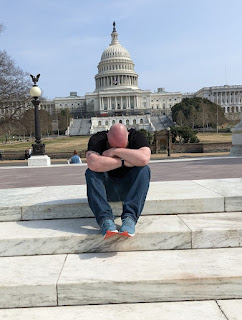It has been a long couple of years. As of this writing, there seems to be a light at the end of the tunnel. COVID-19 cases have been steadily dropping (I myself tested positive in January after receiving my third dose of the vaccine, doses that contributed to preventing me from having any symptoms of the virus), mask mandates have been dropped in many places, and even the CDC is looking forward to loosened restrictions and moving into a stage of the pandemic where we learn to live with the virus.
The last couple of years has resulted in a lot of events that have been canceled, gone virtual, or have resorted to very limited capacity. This includes educational conferences, something that I have enjoyed attending for many years. I tried to do virtual conferences, but they just weren't the same. I realized how much I thrived on meeting with people face-to-face for those "hallway conversations," something that just was not there in the virtual conference setting.
So a few months back, when I was asked by my principal if I wanted to go to The Dream Deferred Conference in Washington, D.C., I was in for many reasons. For starters, I attended the conference last year virtually, and while a virtual is not my cup of tea, the sessions were incredible and I told my principal at the time that I would love to go to it the next time it was in person. Secondly, this conference is not typical of the conference that I usually attend. Most of the conferences that I have attended in the last 5 years or so have been focused on educational technology. A Dream Deferred is a conference hosted by the College Board that focuses on educational issues surrounding Black and African American students; many sessions focus on historically black colleges and universities (HBCUs). This would also give me an opportunity to expand my network in another direction And selfishly, the conference was going to be in WASHINGTON, D.C., a city that I have always wanted to visit but have never had the opportunity to see.
I did not know what to expect going into the conference. For the weeks ahead of its start, various emails were sent by College Board outlining the sessions, where to stay, and COVID protocols. I honestly didn't look much at the sessions ahead of time; I had a feeling some of them would not be on the schedule once the conference started because of the changing dynamics of travel, COVID, etc. (I wasn't wrong). My colleagues and I chose a hotel about a 10 minute walk from the conference hotel, as it was about half of the price. And as for COVID? In the beginning, I was expecting proof of vaccinations and required masking. But because a lot had changed in the three months leading to the conference, COVID requirements changed as well. The conference ended up requiring a proof of vaccination, proof of a negative test within two days of the conference starting (a test that the conference provide by mailing it to attendees a couple of weeks ahead of time), and masks were strongly encouraged (most people were fully masked the entire time, and I honored it as well).
 |
| Why an album cover from one of the most influential hardcore bands of all time? Keep reading... |
The conference offered a ton of great sessions, and while I wish I could have attended more, I was able to get to several incredible sessions. A few of my favorite takeaways from the sessions include:
- a program in a school from Washington, D.C. that meets with EVERY student starting their junior year to assist in transitioning to life after high school by helping students explore their interests, applying for college, trade schools, internships, jobs, etc., checking in on student progress toward getting to their goal for after high school, and following up with students in the years after high school to see where they ended up
- a session from a clinical psychologist about the scientific benefits of self-care for educators and students and ways to "put your mask on first"
- critical race theory (CRT): what it is, what it is not, and how to teach topics deemed to be controversial and sensitive by legislation from states around the country without violating the law
- tips for white educators on how they can support their historically underserved students by building relationships, leading with empathy, being genuine, and more
 |
| My recreation of Minor Threat! |
No comments:
Post a Comment